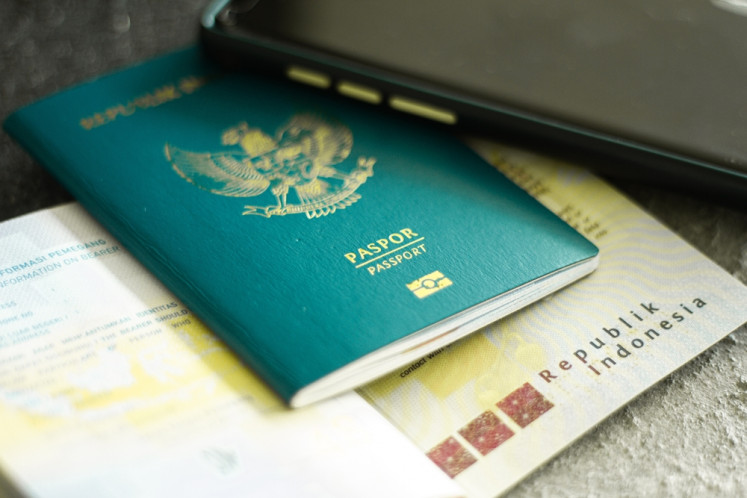Ahok, Antasari ‘distractions’ from flawed supervisory council
Basuki Tjahaja Purnama - Antasari Azhar (JP/Dhoni Setiawan)Not long after President Joko “Jokowi” Widodo said he would select the members of the new Corruption Eradication Commission (KPK) supervisory council, speculations mounted that former Jakarta governor Basuki “Ahok” Tjahaja Purnama and former KPK chairman Antasari Azhar would get the posts
Change Size

Basuki Tjahaja Purnama - Antasari Azhar (JP/Dhoni Setiawan)
Not long after President Joko “Jokowi” Widodo said he would select the members of the new Corruption Eradication Commission (KPK) supervisory council, speculations mounted that former Jakarta governor Basuki “Ahok” Tjahaja Purnama and former KPK chairman Antasari Azhar would get the posts.
Activists and researchers have been adamant that the concept of the council itself is fundamentally flawed, no matter who is selected to sit in it.
“Names like Ahok and Antasari are mere distractions from the core problems with creating a supervisory council in the first place,” Indonesia Corruption Watch (ICW) researcher Donal Fariz said on Thursday.
The supervisory council is a result of the controversial new KPK Law, which was passed in September under dubious circumstances. The law states that the five-member council, selected by the President in “consultation” with the House of Representatives, has the authority to grant or deny permission for KPK investigators to conduct searches, seizures and wiretapping.
Experts and activists have said that the creation of the council, along with other stipulations in the law, will severely hamper the antigraft body’s independence and effectiveness.
On social media, Ahok and Antasari have gained significant traction.
On Saturday, a staunch Ahok supporter, Rudi Valinka, suggested in a tweet that Ahok be made a council member. The tweet had received nearly 18,000 retweets and 7,000 likes at the time of writing.
On Sunday, Dede Budhyarto, another supporter of Jokowi and Ahok, posted a Twitter poll asking who the President should pick for the council. The poll received 5,229 responses, with most of the votes going to Ahok and Antasari.
Both Ahok and Antasari have faced criminal charges and served prison sentences in controversial cases. Ahok was found guilty of blasphemy in 2017 after allegedly insulting the Quran in a speech he made in the Thousand Islands. He served 20 months in prison before being released in January.
Antasari was sentenced to 18 years imprisonment in 2010 for masterminding the murder of Nasrudin Zulkarnaen, a director of state-owned pharmaceutical company PT Putra Rajawali Banjaran. Antasari has insisted that he is not guilty of the crime, and he was granted clemency by Jokowi in January 2017 after being released on parole in November 2016.
When asked about the possibility of selecting Ahok and Antasari for the council, Jokowi said only that the council was still being “deliberated”.
“Of course, we hope for people with integrity,” Jokowi said on Thursday as quoted by the Antara news agency.
Previously, State Secretary Pratikno had said that the council would likely consist mostly of legal experts.
“But there will also be [members] with a nonlegal [background], because there is a social dimension,” he told reporters on Monday. “But it has not been finalized yet. We are still listing [candidates].”
Gajah Mada University’s Center for Anticorruption Studies (Pukat UGM) researcher Zainal Arifin Mochtar told the Post he did not want to talk about the selection of council members because he was completely against the idea of a supervisory council in the first place.
“Is it proper for a supervisory council, which should perform an oversight function, to become a body that issues permits for searches, seizures and wiretapping, which are law-enforcement functions?” Zainal said.
Donal echoed Zainal’s sentiments, saying that the design of the council was “legally flawed”, making its composition a moot point.
“The council usurps the authority that should be in the hands of investigators and the courts. The concept of the council itself is misguided,” he said.
Donal added that the President’s ability to name council members without confirmation hearings from the House made the KPK more open to accusations of political bias.
“Even with confirmation hearings, the selection of certain KPK commissioners has raised questions,” he said. “With the supervisory council members being directly selected by the President — and the broad authority that they have — there will be even more accusations of political bias, which will weaken public trust in the KPK.”
Jokowi previously said he would consider issuing regulation in lieu of law (Perppu) that would revoke the revised KPK Law. He has since stepped back from the plan, saying he would not issue a Perppu while the law was undergoing a judicial review at the Constitutional Court.
Donal acknowledged that the chances of a Perppu were looking increasingly slim but said that ICW and other civil society organizations would continue to fight against the law.
“President Jokowi is free to persevere with the mistakes that he has made since first giving the go-ahead for the law’s revision, but we will continue with our legal efforts [to overturn the law],” he said.









